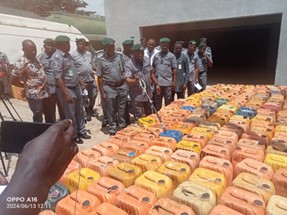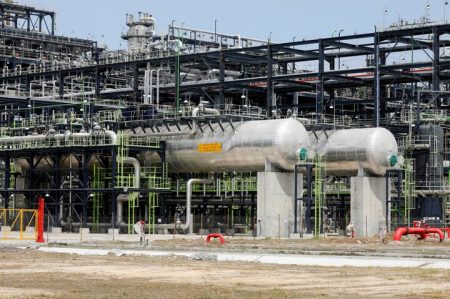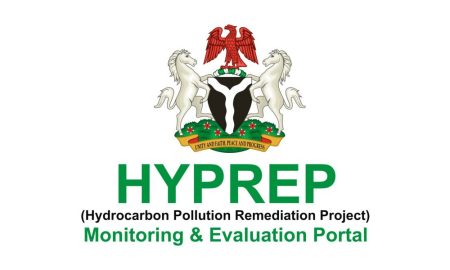3 December 2011, Sweetcrude, ABUJA – About 100 companies have been fingered as those who shared about N3.655 trillion meant for petroleum subsidy in the country in the last five years, the Joint Senate Committee on Petroleum Downstream, Finance and Appropriation was told Friday.
The revelation emerged at the resumed public hearing on the operations of the fuel subsidy regime in the country.
Those alleged to have benefitted from the fuel subsidy include the Chief Executive Officer of ConOil, Mike Adenuga; Chief Executive Officer of Oando, Wale Tinubu; Chairman, Honey Well Group of Companies, Oba Otudeko, Chairman, Folawiyo Group, Chief Wahab Iyanda Folawiyo, among others.
Chairman of the Panel, Senator Magnus Ngei Abe, PDP, Rivers South East revealed that over 100 companies, including construction companies participated in the sharing of the money between January and August 2011.
This figure however is in conflict with the N1.348 trillion said to have been spent on subsidy by the Petroleum Product Pricing Regulatory Agency, PPPRA.
Abe who is also the chairman of the Senate Committee on Petroleum (Downstream) named the oil companies which benefitted from the subsidy as at August 2001 to include: Oando, Obat, Capital Oil, Enak Oil and Gas, Integrated Oil and Gas, African Petroleum, Folawiyo Oil, Honey Well, Eternal Oil, Fort Oil, Bovas and Company Nigeria Limited, AZ Oil, Atio Oil, IPMAN Investment Ltd, D. Jones Oil, among others.
The Committee frowned at the discovery that some of the firms listed were construction companies that have nothing to do with oil, adding that such companies were too many and put the credibility of their participatory process into question.
The Executive Director, PPPRA, Reginald Stanley, told the Committee that the gross amount spent on fuel subsidy from 2006 to September this year stood at N3.655trillion. The figure contradicted the N1.426 trillion submitted by the NNPC as subsidy on the products as at August 2011.
Stanley argued that the correct figure was N1.348 trillion, just as he debunked the alleged N450 billion kerosene subsidies owed the NNPC by the Federal Government, adding that the claims were not recorded in their books.
However, Senator Abe said a breakdown of the amount shared by those involved in the fuel subsidy management showed that Oando Nigeria Plc allegedly got – N228.506billion, Integrated Oil and Gas Plc, N30billion, MRS-N224.818 billion, ConOil- N37.96billion, Enak Oil & Gas- N19.684billion, Bovas & Co. Nig Ltd, N5.685billion, Obat- N85billion and AP- N104.5billion.
Others are Folawiyo Oil- N113.3b, IPMAN Investment Limited- N10.9billion, ACON- N24.1billion, Atio Oil- N64.4billion, AMP- N11.4billion, HoneyWell- N12.2billion, Emac Oil- N19.2billion, D.Jones Oil- N14.8billion while Capital Oil and A-Z Oil got N22.4billion and N18.613billion respectively.
Also as beneficiaries according to the Senate were Eternal Oil- N5.57 billion; Dozil Oil- N3.375 billion; Fort Oil- N8.582 billion while some construction companies were also on the list but, the committee said they shut down their web sites since the commencement of the probe.
Senator Abe who invited the marketers to explain how much they benefited from the subsidy, however questioned the rational in involving over 100 marketers, even as some of them were construction companies that “have no business importing petroleum products.”
Earlier, the Senate had demanded from the Group Managing Director, NNPC, Austin Oniwon the cost of locally refined petroleum products as against imported fuel and whether there was subsidy on locally refined products.
Responding, Oniwon said that it cost between $4 and $5, depending on the exchange rate, to refine a barrel of oil, which is equivalent to 159 litres, adding that the locally refined products equally attracted subsidy, but at a reduced rate when compared to imported products.
“We collect subsidy on locally refined products but it is less than what we collect on imported product. But since we do not include trade marking and other charges on imported products, it costs N11.87 less on locally refined products and N11.87 more on imported ones. An indication that NNPC makes more money on imported products than from the locally produced ones.”
On the allegation of round tripping – a situation, where importers return the locally produced product at the cost of imported, Oniwon denied any knowledge of such, saying, “I am already under oath and it will not be in my interest to say what I don’t know about. I have not cut anybody round tripping and I would not want to speculate.”
Some of the questions that never got satisfactory answers from Oniwon and Stanley were on evidence of payment of dividends accruing from the country’s joint venture with Nigeria National Liquidities (NNLG), Shell Petroleum and other companies as well as the reason why the nation was not in a hurry to resuscitate existing refineries.
The panel adjourned hearing till Monday December 12, even as it was discovered that several marketers that did not meet the criteria before benefiting from the subsidy and were hence in the habit of making false claims.
According to Senator Abe, marketers were mandated to own tank farms (petrol deports) of not less than 5000 metric tonnes, and should be registered with the Corporate Affairs Commission, CAC, as oil companies, adding that only 11 marketers own storage facilities,while the rest were “throughput” or sharing depots with filling stations just as some were registered construction companies.
Before the Joint committee adjourned, the Chairman ordered Oniwon to produce the total amount expended on the Turn Around Maintenance, TAM, from 1999 to date; total dividends accruing to NNPC from the Joint Venture Companies; names of accused marketers; investigations conducted, results and subsequent punishments to defaulters at the next sitting.




